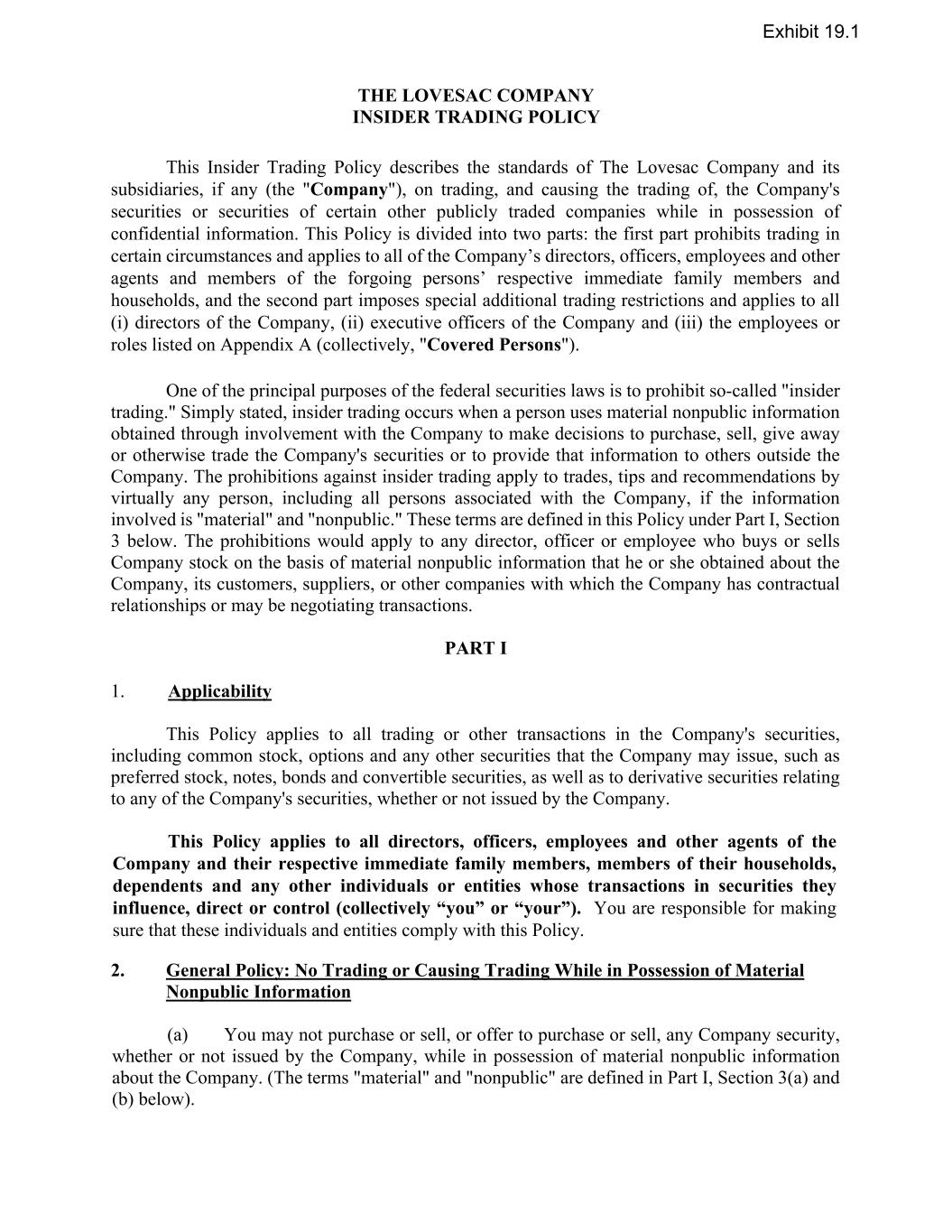
THE LOVESAC COMPANY INSIDER TRADING POLICY This Insider Trading Policy describes the standards of The Lovesac Company and its subsidiaries, if any (the "Company"), on trading, and causing the trading of, the Company's securities or securities of certain other publicly traded companies while in possession of confidential information. This Policy is divided into two parts: the first part prohibits trading in certain circumstances and applies to all of the Company’s directors, officers, employees and other agents and members of the forgoing persons’ respective immediate family members and households, and the second part imposes special additional trading restrictions and applies to all (i) directors of the Company, (ii) executive officers of the Company and (iii) the employees or roles listed on Appendix A (collectively, "Covered Persons"). One of the principal purposes of the federal securities laws is to prohibit so-called "insider trading." Simply stated, insider trading occurs when a person uses material nonpublic information obtained through involvement with the Company to make decisions to purchase, sell, give away or otherwise trade the Company's securities or to provide that information to others outside the Company. The prohibitions against insider trading apply to trades, tips and recommendations by virtually any person, including all persons associated with the Company, if the information involved is "material" and "nonpublic." These terms are defined in this Policy under Part I, Section 3 below. The prohibitions would apply to any director, officer or employee who buys or sells Company stock on the basis of material nonpublic information that he or she obtained about the Company, its customers, suppliers, or other companies with which the Company has contractual relationships or may be negotiating transactions. PART I 1. Applicability This Policy applies to all trading or other transactions in the Company's securities, including common stock, options and any other securities that the Company may issue, such as preferred stock, notes, bonds and convertible securities, as well as to derivative securities relating to any of the Company's securities, whether or not issued by the Company. This Policy applies to all directors, officers, employees and other agents of the Company and their respective immediate family members, members of their households, dependents and any other individuals or entities whose transactions in securities they influence, direct or control (collectively “you” or “your”). You are responsible for making sure that these individuals and entities comply with this Policy. 2. General Policy: No Trading or Causing Trading While in Possession of Material Nonpublic Information (a) You may not purchase or sell, or offer to purchase or sell, any Company security, whether or not issued by the Company, while in possession of material nonpublic information about the Company. (The terms "material" and "nonpublic" are defined in Part I, Section 3(a) and (b) below). Exhibit 19.1
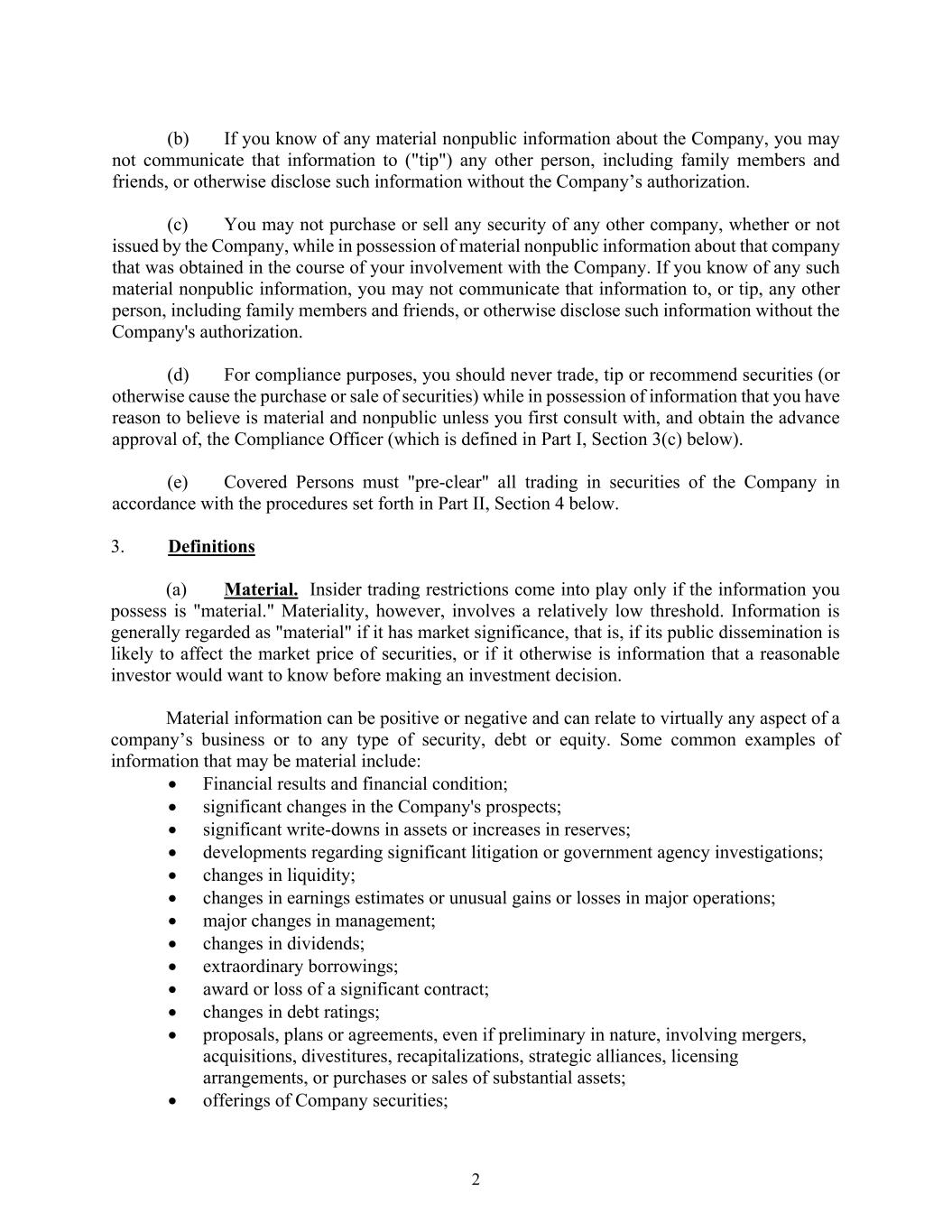
2 (b) If you know of any material nonpublic information about the Company, you may not communicate that information to ("tip") any other person, including family members and friends, or otherwise disclose such information without the Company’s authorization. (c) You may not purchase or sell any security of any other company, whether or not issued by the Company, while in possession of material nonpublic information about that company that was obtained in the course of your involvement with the Company. If you know of any such material nonpublic information, you may not communicate that information to, or tip, any other person, including family members and friends, or otherwise disclose such information without the Company's authorization. (d) For compliance purposes, you should never trade, tip or recommend securities (or otherwise cause the purchase or sale of securities) while in possession of information that you have reason to believe is material and nonpublic unless you first consult with, and obtain the advance approval of, the Compliance Officer (which is defined in Part I, Section 3(c) below). (e) Covered Persons must "pre-clear" all trading in securities of the Company in accordance with the procedures set forth in Part II, Section 4 below. 3. Definitions (a) Material. Insider trading restrictions come into play only if the information you possess is "material." Materiality, however, involves a relatively low threshold. Information is generally regarded as "material" if it has market significance, that is, if its public dissemination is likely to affect the market price of securities, or if it otherwise is information that a reasonable investor would want to know before making an investment decision. Material information can be positive or negative and can relate to virtually any aspect of a company’s business or to any type of security, debt or equity. Some common examples of information that may be material include: • Financial results and financial condition; • significant changes in the Company's prospects; • significant write-downs in assets or increases in reserves; • developments regarding significant litigation or government agency investigations; • changes in liquidity; • changes in earnings estimates or unusual gains or losses in major operations; • major changes in management; • changes in dividends; • extraordinary borrowings; • award or loss of a significant contract; • changes in debt ratings; • proposals, plans or agreements, even if preliminary in nature, involving mergers, acquisitions, divestitures, recapitalizations, strategic alliances, licensing arrangements, or purchases or sales of substantial assets; • offerings of Company securities;
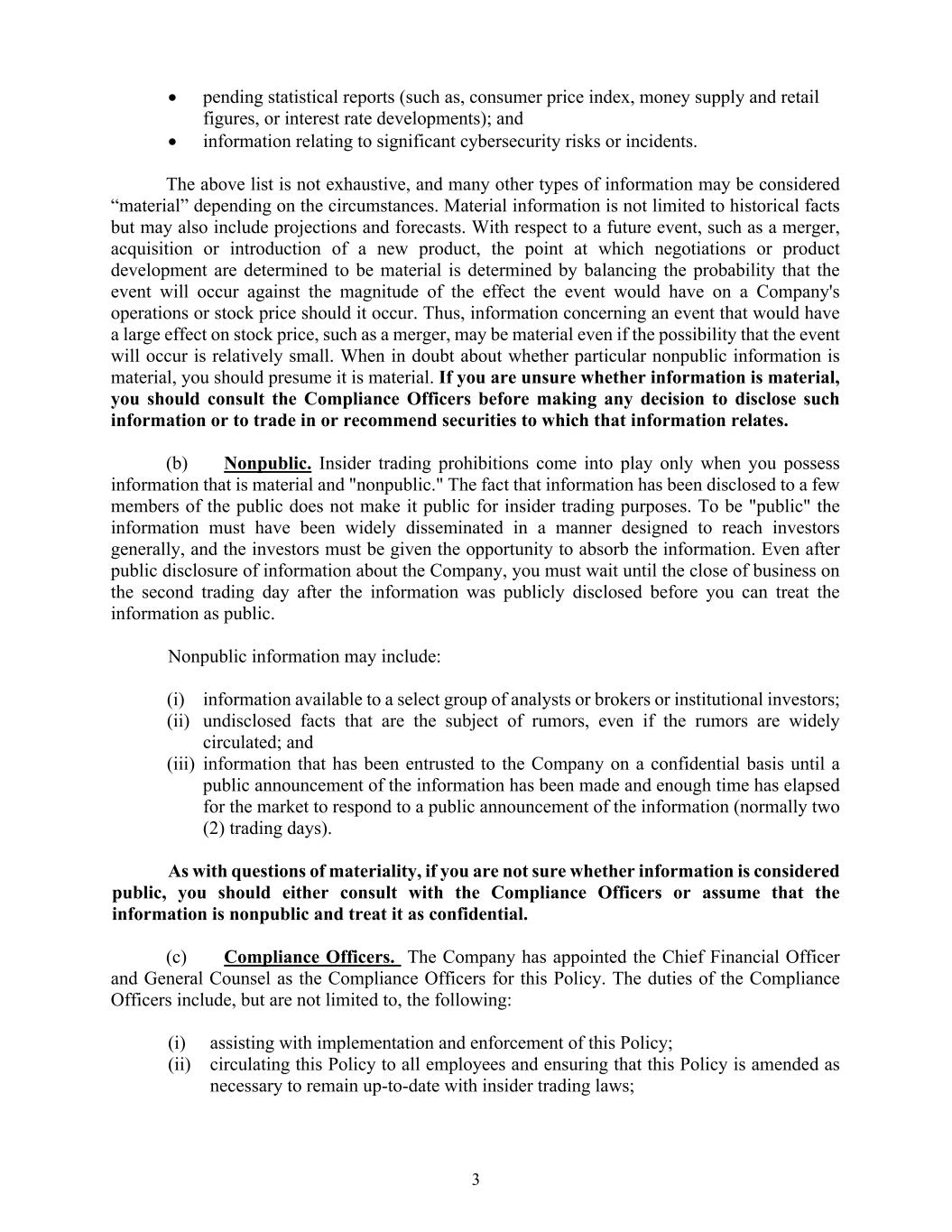
3 • pending statistical reports (such as, consumer price index, money supply and retail figures, or interest rate developments); and • information relating to significant cybersecurity risks or incidents. The above list is not exhaustive, and many other types of information may be considered “material” depending on the circumstances. Material information is not limited to historical facts but may also include projections and forecasts. With respect to a future event, such as a merger, acquisition or introduction of a new product, the point at which negotiations or product development are determined to be material is determined by balancing the probability that the event will occur against the magnitude of the effect the event would have on a Company's operations or stock price should it occur. Thus, information concerning an event that would have a large effect on stock price, such as a merger, may be material even if the possibility that the event will occur is relatively small. When in doubt about whether particular nonpublic information is material, you should presume it is material. If you are unsure whether information is material, you should consult the Compliance Officers before making any decision to disclose such information or to trade in or recommend securities to which that information relates. (b) Nonpublic. Insider trading prohibitions come into play only when you possess information that is material and "nonpublic." The fact that information has been disclosed to a few members of the public does not make it public for insider trading purposes. To be "public" the information must have been widely disseminated in a manner designed to reach investors generally, and the investors must be given the opportunity to absorb the information. Even after public disclosure of information about the Company, you must wait until the close of business on the second trading day after the information was publicly disclosed before you can treat the information as public. Nonpublic information may include: (i) information available to a select group of analysts or brokers or institutional investors; (ii) undisclosed facts that are the subject of rumors, even if the rumors are widely circulated; and (iii) information that has been entrusted to the Company on a confidential basis until a public announcement of the information has been made and enough time has elapsed for the market to respond to a public announcement of the information (normally two (2) trading days). As with questions of materiality, if you are not sure whether information is considered public, you should either consult with the Compliance Officers or assume that the information is nonpublic and treat it as confidential. (c) Compliance Officers. The Company has appointed the Chief Financial Officer and General Counsel as the Compliance Officers for this Policy. The duties of the Compliance Officers include, but are not limited to, the following: (i) assisting with implementation and enforcement of this Policy; (ii) circulating this Policy to all employees and ensuring that this Policy is amended as necessary to remain up-to-date with insider trading laws;
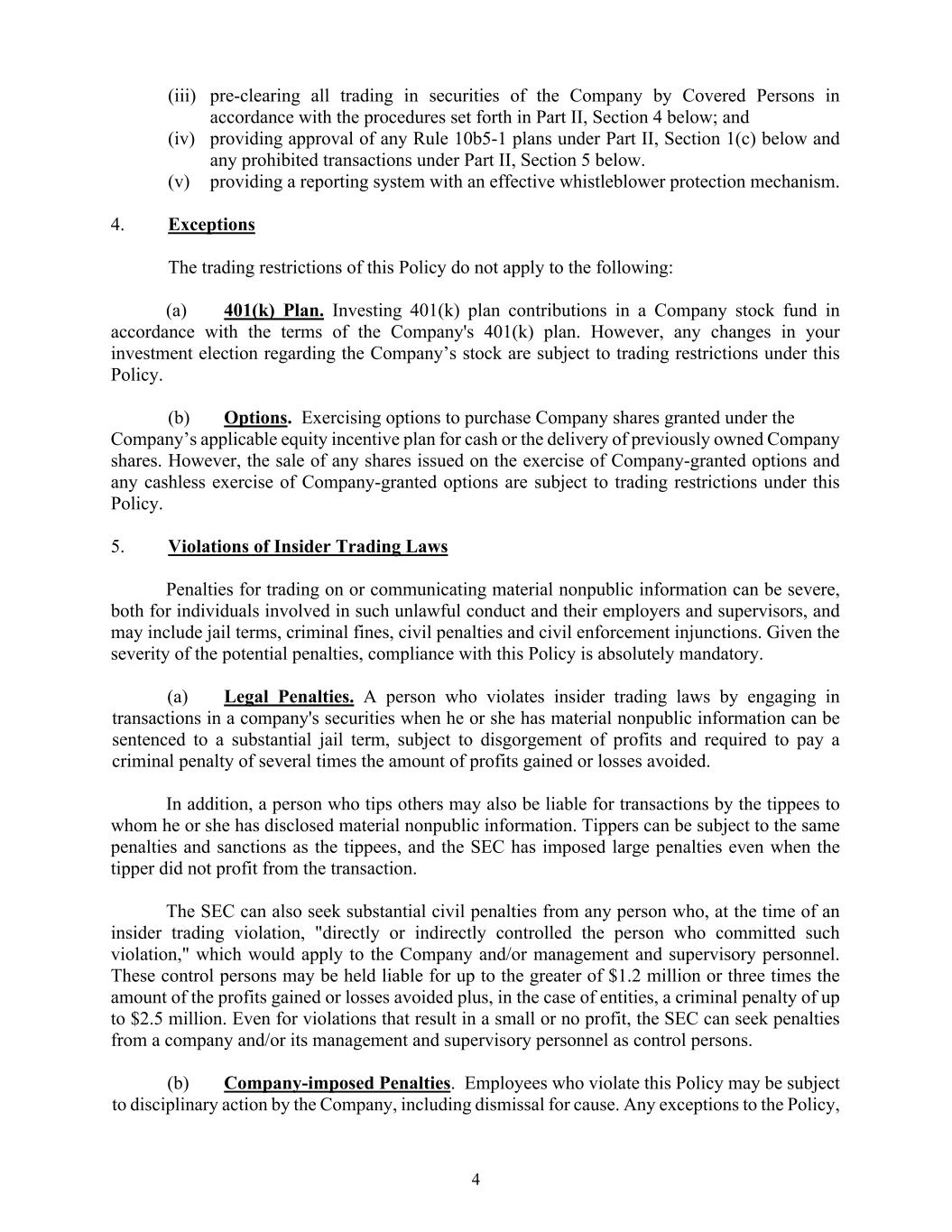
4 (iii) pre-clearing all trading in securities of the Company by Covered Persons in accordance with the procedures set forth in Part II, Section 4 below; and (iv) providing approval of any Rule 10b5-1 plans under Part II, Section 1(c) below and any prohibited transactions under Part II, Section 5 below. (v) providing a reporting system with an effective whistleblower protection mechanism. 4. Exceptions The trading restrictions of this Policy do not apply to the following: (a) 401(k) Plan. Investing 401(k) plan contributions in a Company stock fund in accordance with the terms of the Company's 401(k) plan. However, any changes in your investment election regarding the Company’s stock are subject to trading restrictions under this Policy. (b) Options. Exercising options to purchase Company shares granted under the Company’s applicable equity incentive plan for cash or the delivery of previously owned Company shares. However, the sale of any shares issued on the exercise of Company-granted options and any cashless exercise of Company-granted options are subject to trading restrictions under this Policy. 5. Violations of Insider Trading Laws Penalties for trading on or communicating material nonpublic information can be severe, both for individuals involved in such unlawful conduct and their employers and supervisors, and may include jail terms, criminal fines, civil penalties and civil enforcement injunctions. Given the severity of the potential penalties, compliance with this Policy is absolutely mandatory. (a) Legal Penalties. A person who violates insider trading laws by engaging in transactions in a company's securities when he or she has material nonpublic information can be sentenced to a substantial jail term, subject to disgorgement of profits and required to pay a criminal penalty of several times the amount of profits gained or losses avoided. In addition, a person who tips others may also be liable for transactions by the tippees to whom he or she has disclosed material nonpublic information. Tippers can be subject to the same penalties and sanctions as the tippees, and the SEC has imposed large penalties even when the tipper did not profit from the transaction. The SEC can also seek substantial civil penalties from any person who, at the time of an insider trading violation, "directly or indirectly controlled the person who committed such violation," which would apply to the Company and/or management and supervisory personnel. These control persons may be held liable for up to the greater of $1.2 million or three times the amount of the profits gained or losses avoided plus, in the case of entities, a criminal penalty of up to $2.5 million. Even for violations that result in a small or no profit, the SEC can seek penalties from a company and/or its management and supervisory personnel as control persons. (b) Company-imposed Penalties. Employees who violate this Policy may be subject to disciplinary action by the Company, including dismissal for cause. Any exceptions to the Policy,
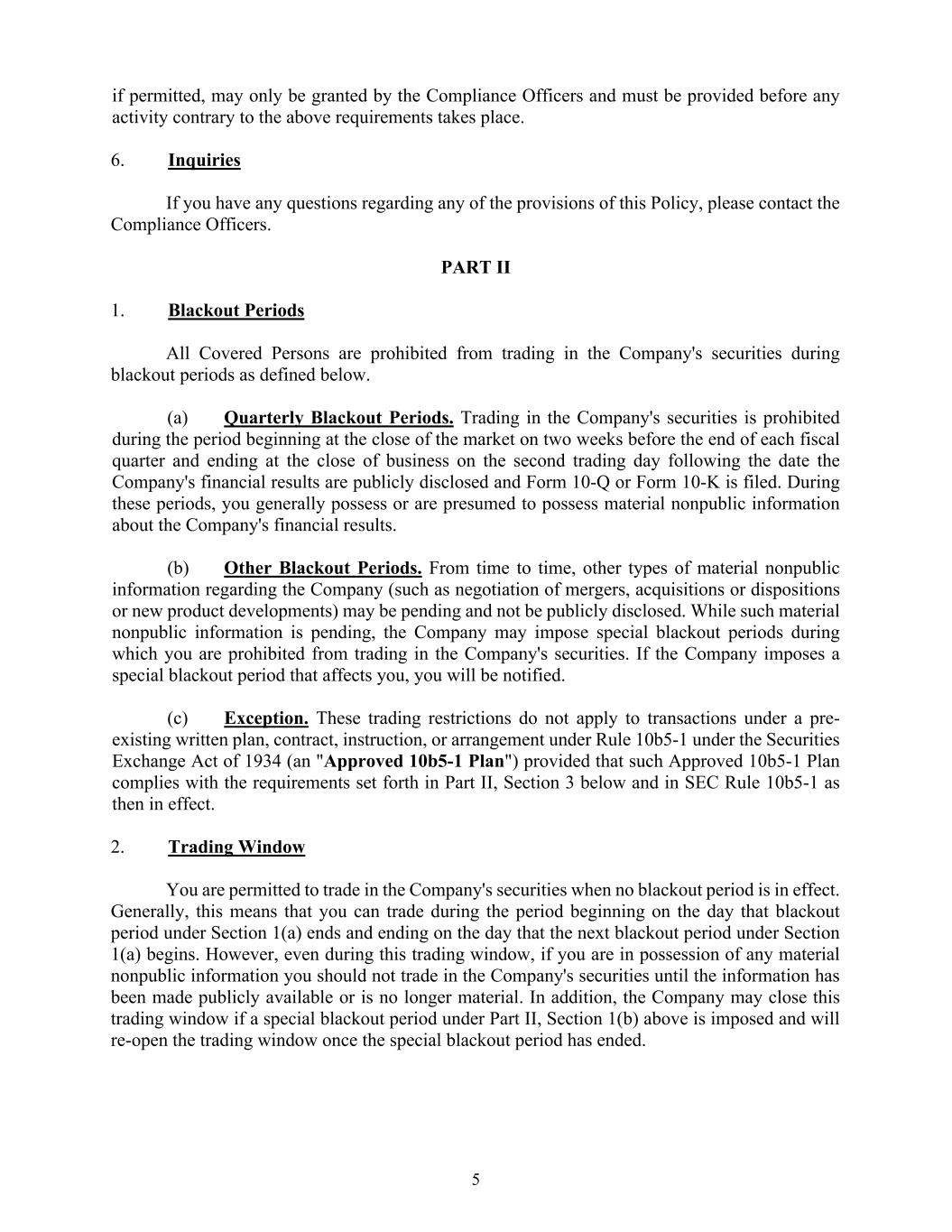
5 if permitted, may only be granted by the Compliance Officers and must be provided before any activity contrary to the above requirements takes place. 6. Inquiries If you have any questions regarding any of the provisions of this Policy, please contact the Compliance Officers. PART II 1. Blackout Periods All Covered Persons are prohibited from trading in the Company's securities during blackout periods as defined below. (a) Quarterly Blackout Periods. Trading in the Company's securities is prohibited during the period beginning at the close of the market on two weeks before the end of each fiscal quarter and ending at the close of business on the second trading day following the date the Company's financial results are publicly disclosed and Form 10-Q or Form 10-K is filed. During these periods, you generally possess or are presumed to possess material nonpublic information about the Company's financial results. (b) Other Blackout Periods. From time to time, other types of material nonpublic information regarding the Company (such as negotiation of mergers, acquisitions or dispositions or new product developments) may be pending and not be publicly disclosed. While such material nonpublic information is pending, the Company may impose special blackout periods during which you are prohibited from trading in the Company's securities. If the Company imposes a special blackout period that affects you, you will be notified. (c) Exception. These trading restrictions do not apply to transactions under a pre- existing written plan, contract, instruction, or arrangement under Rule 10b5-1 under the Securities Exchange Act of 1934 (an "Approved 10b5-1 Plan") provided that such Approved 10b5-1 Plan complies with the requirements set forth in Part II, Section 3 below and in SEC Rule 10b5-1 as then in effect. 2. Trading Window You are permitted to trade in the Company's securities when no blackout period is in effect. Generally, this means that you can trade during the period beginning on the day that blackout period under Section 1(a) ends and ending on the day that the next blackout period under Section 1(a) begins. However, even during this trading window, if you are in possession of any material nonpublic information you should not trade in the Company's securities until the information has been made publicly available or is no longer material. In addition, the Company may close this trading window if a special blackout period under Part II, Section 1(b) above is imposed and will re-open the trading window once the special blackout period has ended.
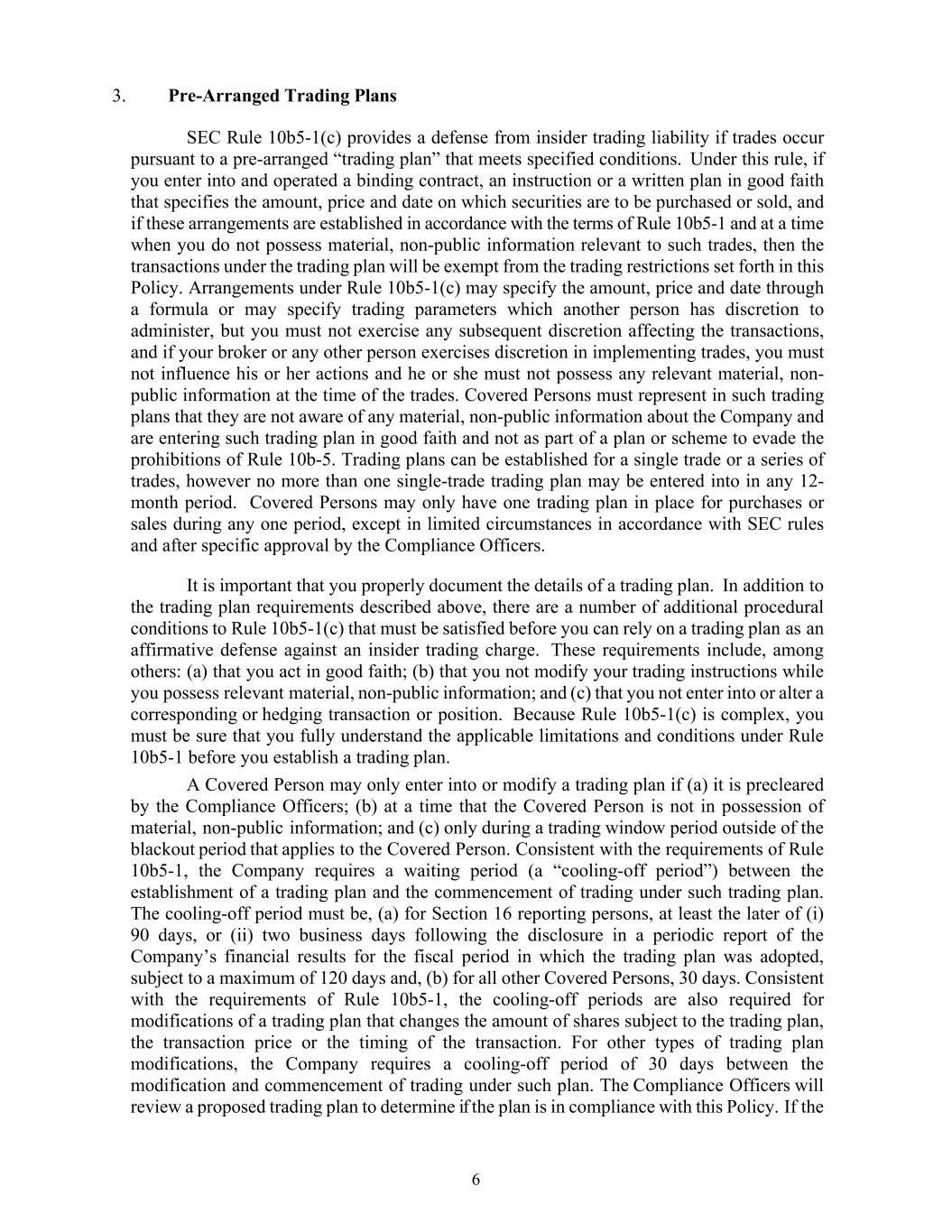
6 3. Pre-Arranged Trading Plans SEC Rule 10b5-1(c) provides a defense from insider trading liability if trades occur pursuant to a pre-arranged “trading plan” that meets specified conditions. Under this rule, if you enter into and operated a binding contract, an instruction or a written plan in good faith that specifies the amount, price and date on which securities are to be purchased or sold, and if these arrangements are established in accordance with the terms of Rule 10b5-1 and at a time when you do not possess material, non-public information relevant to such trades, then the transactions under the trading plan will be exempt from the trading restrictions set forth in this Policy. Arrangements under Rule 10b5-1(c) may specify the amount, price and date through a formula or may specify trading parameters which another person has discretion to administer, but you must not exercise any subsequent discretion affecting the transactions, and if your broker or any other person exercises discretion in implementing trades, you must not influence his or her actions and he or she must not possess any relevant material, non- public information at the time of the trades. Covered Persons must represent in such trading plans that they are not aware of any material, non-public information about the Company and are entering such trading plan in good faith and not as part of a plan or scheme to evade the prohibitions of Rule 10b-5. Trading plans can be established for a single trade or a series of trades, however no more than one single-trade trading plan may be entered into in any 12- month period. Covered Persons may only have one trading plan in place for purchases or sales during any one period, except in limited circumstances in accordance with SEC rules and after specific approval by the Compliance Officers. It is important that you properly document the details of a trading plan. In addition to the trading plan requirements described above, there are a number of additional procedural conditions to Rule 10b5-1(c) that must be satisfied before you can rely on a trading plan as an affirmative defense against an insider trading charge. These requirements include, among others: (a) that you act in good faith; (b) that you not modify your trading instructions while you possess relevant material, non-public information; and (c) that you not enter into or alter a corresponding or hedging transaction or position. Because Rule 10b5-1(c) is complex, you must be sure that you fully understand the applicable limitations and conditions under Rule 10b5-1 before you establish a trading plan. A Covered Person may only enter into or modify a trading plan if (a) it is precleared by the Compliance Officers; (b) at a time that the Covered Person is not in possession of material, non-public information; and (c) only during a trading window period outside of the blackout period that applies to the Covered Person. Consistent with the requirements of Rule 10b5-1, the Company requires a waiting period (a “cooling-off period”) between the establishment of a trading plan and the commencement of trading under such trading plan. The cooling-off period must be, (a) for Section 16 reporting persons, at least the later of (i) 90 days, or (ii) two business days following the disclosure in a periodic report of the Company’s financial results for the fiscal period in which the trading plan was adopted, subject to a maximum of 120 days and, (b) for all other Covered Persons, 30 days. Consistent with the requirements of Rule 10b5-1, the cooling-off periods are also required for modifications of a trading plan that changes the amount of shares subject to the trading plan, the transaction price or the timing of the transaction. For other types of trading plan modifications, the Company requires a cooling-off period of 30 days between the modification and commencement of trading under such plan. The Compliance Officers will review a proposed trading plan to determine if the plan is in compliance with this Policy. If the
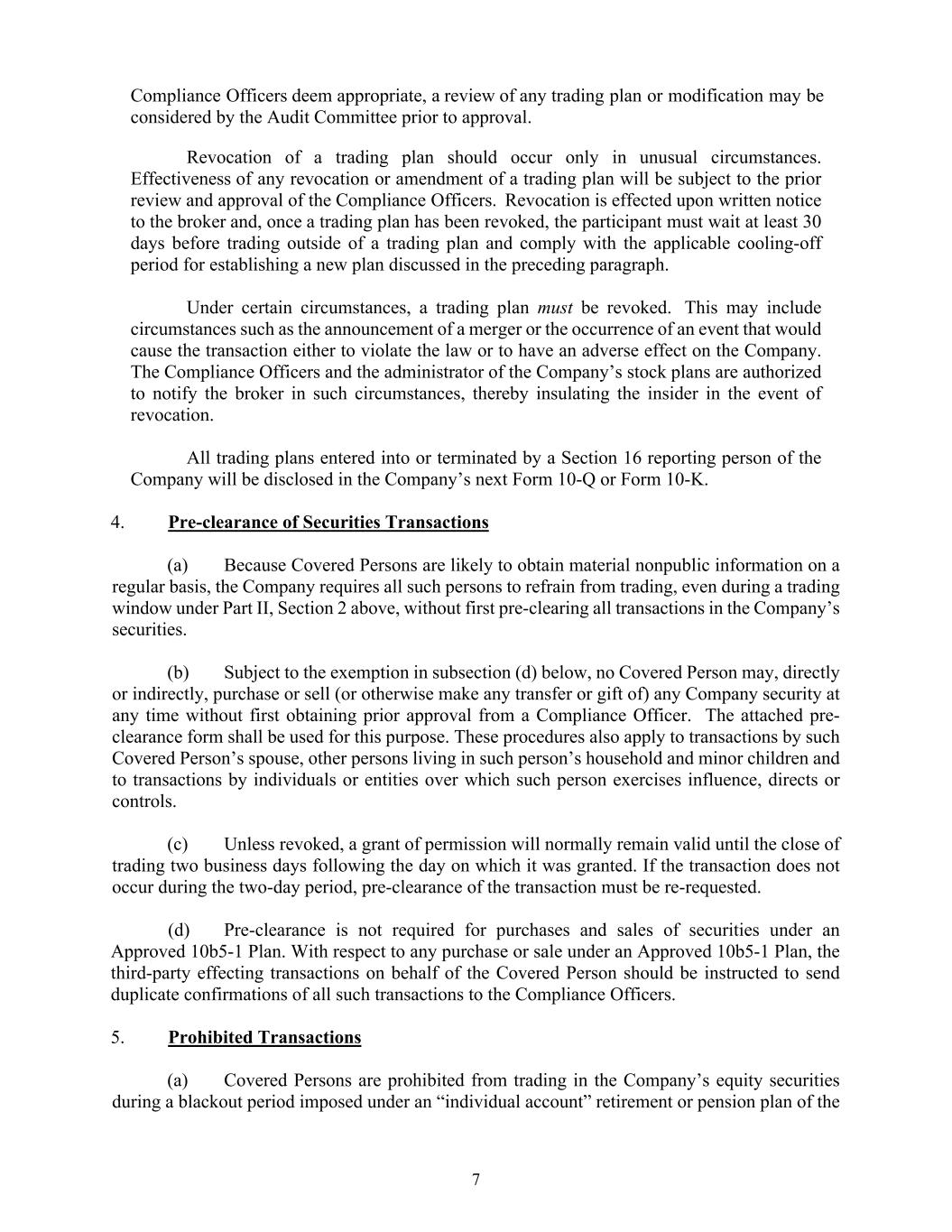
7 Compliance Officers deem appropriate, a review of any trading plan or modification may be considered by the Audit Committee prior to approval. Revocation of a trading plan should occur only in unusual circumstances. Effectiveness of any revocation or amendment of a trading plan will be subject to the prior review and approval of the Compliance Officers. Revocation is effected upon written notice to the broker and, once a trading plan has been revoked, the participant must wait at least 30 days before trading outside of a trading plan and comply with the applicable cooling-off period for establishing a new plan discussed in the preceding paragraph. Under certain circumstances, a trading plan must be revoked. This may include circumstances such as the announcement of a merger or the occurrence of an event that would cause the transaction either to violate the law or to have an adverse effect on the Company. The Compliance Officers and the administrator of the Company’s stock plans are authorized to notify the broker in such circumstances, thereby insulating the insider in the event of revocation. All trading plans entered into or terminated by a Section 16 reporting person of the Company will be disclosed in the Company’s next Form 10-Q or Form 10-K. 4. Pre-clearance of Securities Transactions (a) Because Covered Persons are likely to obtain material nonpublic information on a regular basis, the Company requires all such persons to refrain from trading, even during a trading window under Part II, Section 2 above, without first pre-clearing all transactions in the Company’s securities. (b) Subject to the exemption in subsection (d) below, no Covered Person may, directly or indirectly, purchase or sell (or otherwise make any transfer or gift of) any Company security at any time without first obtaining prior approval from a Compliance Officer. The attached pre- clearance form shall be used for this purpose. These procedures also apply to transactions by such Covered Person’s spouse, other persons living in such person’s household and minor children and to transactions by individuals or entities over which such person exercises influence, directs or controls. (c) Unless revoked, a grant of permission will normally remain valid until the close of trading two business days following the day on which it was granted. If the transaction does not occur during the two-day period, pre-clearance of the transaction must be re-requested. (d) Pre-clearance is not required for purchases and sales of securities under an Approved 10b5-1 Plan. With respect to any purchase or sale under an Approved 10b5-1 Plan, the third-party effecting transactions on behalf of the Covered Person should be instructed to send duplicate confirmations of all such transactions to the Compliance Officers. 5. Prohibited Transactions (a) Covered Persons are prohibited from trading in the Company’s equity securities during a blackout period imposed under an “individual account” retirement or pension plan of the
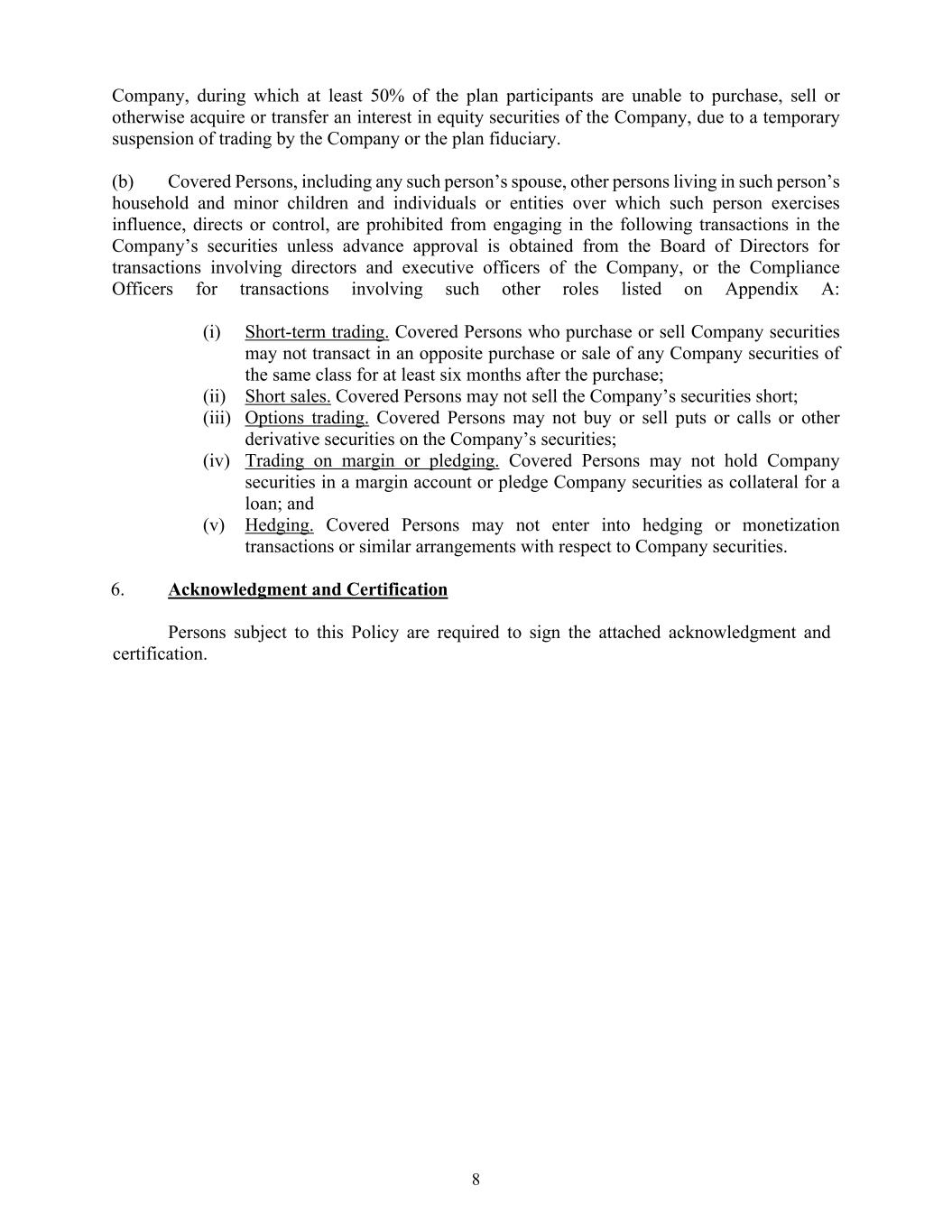
8 Company, during which at least 50% of the plan participants are unable to purchase, sell or otherwise acquire or transfer an interest in equity securities of the Company, due to a temporary suspension of trading by the Company or the plan fiduciary. (b) Covered Persons, including any such person’s spouse, other persons living in such person’s household and minor children and individuals or entities over which such person exercises influence, directs or control, are prohibited from engaging in the following transactions in the Company’s securities unless advance approval is obtained from the Board of Directors for transactions involving directors and executive officers of the Company, or the Compliance Officers for transactions involving such other roles listed on Appendix A: (i) Short-term trading. Covered Persons who purchase or sell Company securities may not transact in an opposite purchase or sale of any Company securities of the same class for at least six months after the purchase; (ii) Short sales. Covered Persons may not sell the Company’s securities short; (iii) Options trading. Covered Persons may not buy or sell puts or calls or other derivative securities on the Company’s securities; (iv) Trading on margin or pledging. Covered Persons may not hold Company securities in a margin account or pledge Company securities as collateral for a loan; and (v) Hedging. Covered Persons may not enter into hedging or monetization transactions or similar arrangements with respect to Company securities. 6. Acknowledgment and Certification Persons subject to this Policy are required to sign the attached acknowledgment and certification.